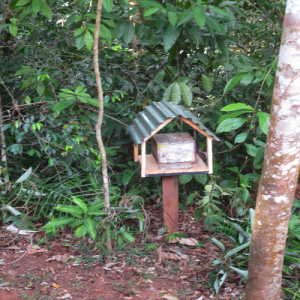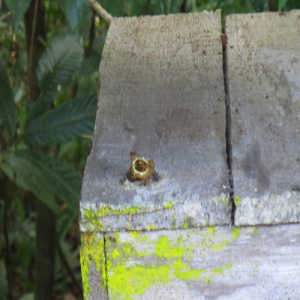Written by: Lauren Wong
On one of our afternoons in Costa Rica, we came across stingless bees at a farm called Villas Mastatal. I had never heard of bees that did not sting people and were still able to produce honey. I learned these abejas (bees in Spanish) are known to locals as “markitas”. Not only do they not sting, they also practice selective pollination instead of pollinating all plants they encounter. These bees produce less honey, but their honey is much stronger, sweeter, potent and used for medicinal reasons. Our guide Javier told us a drop of honey is placed in a human’s eye if there is an infection. In addition, the bees seal up the chimney hole of their home at night with wax to prevent ants and other insects from crawling in.
instead of pollinating all plants they encounter. These bees produce less honey, but their honey is much stronger, sweeter, potent and used for medicinal reasons. Our guide Javier told us a drop of honey is placed in a human’s eye if there is an infection. In addition, the bees seal up the chimney hole of their home at night with wax to prevent ants and other insects from crawling in.
I thought the relationship between bees and a person in Costa Rica versus the United States is symbolic of how Americans view their wildlife. I know that where I am from, California, people always run away from bees and avoid them at all costs. We fear bees and underestimate their role in the ecosystem. They are critical to pollinating plants and making sure our plants and flowers are thriving. In Costa Rica, the bee homes are strategically placed close to the edge of the forest so they will be close to plants but the bees are free to roam as they please.
Javier also told us that bees in America are typically Africanized bees and pollinate everything, not differentiating between crops.  He also said it is bad for bees to pollinate only one type of crop and farmers often have to transport the bees from farm to farm to ensure they can pollinate efficiently. Even the bees in America are being put to work for the sole benefit of producing larger and more plentiful crops. In addition, although the bees from Costa Rica produce less honey, the quality is much higher and the people only take what they need. The United States takes a much more business-like approach to farming and reaping their crops. In Costa Rica, we visited four different farms and I noticed that fruits and vegetables were being grown in smaller quantities, but they were also using much more natural and eco-friendly methods of growing them. This shows Costa Ricans take what they need from the earth’s resources and do not try to produce unrealistic amounts by polluting their plants with pesticides and unnatural substances.
He also said it is bad for bees to pollinate only one type of crop and farmers often have to transport the bees from farm to farm to ensure they can pollinate efficiently. Even the bees in America are being put to work for the sole benefit of producing larger and more plentiful crops. In addition, although the bees from Costa Rica produce less honey, the quality is much higher and the people only take what they need. The United States takes a much more business-like approach to farming and reaping their crops. In Costa Rica, we visited four different farms and I noticed that fruits and vegetables were being grown in smaller quantities, but they were also using much more natural and eco-friendly methods of growing them. This shows Costa Ricans take what they need from the earth’s resources and do not try to produce unrealistic amounts by polluting their plants with pesticides and unnatural substances.
I have a larger appreciation for people who locally grow fruits and vegetables and I hope upon returning to Irvine, I can take advantage of our farmers market or even try growing my own produce. The stingless bees taught me a lesson in where my food comes from and how it is produced. I sure hope one day I can taste honey from those stingless bees someday!
